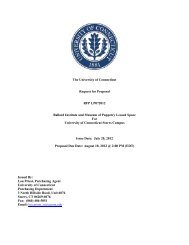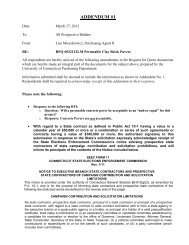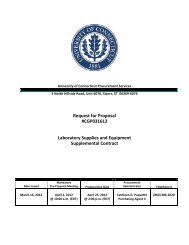Purchasing Department - University of Connecticut
Purchasing Department - University of Connecticut
Purchasing Department - University of Connecticut
Create successful ePaper yourself
Turn your PDF publications into a flip-book with our unique Google optimized e-Paper software.
Civil penalties—Up to $2,000 or twice the amount <strong>of</strong> the prohibited contribution, whichever is<br />
greater, against a principal or a contractor. Any state contractor or prospective state contractor<br />
which fails to make reasonable efforts to comply with the provisions requiring notice to its<br />
principals <strong>of</strong> these prohibitions and the possible consequences <strong>of</strong> their violations may also be<br />
subject to civil penalties <strong>of</strong> up to $2,000 or twice the amount <strong>of</strong> the prohibited contributions made<br />
by their principals.<br />
Criminal penalties—Any knowing and willful violation <strong>of</strong> the prohibition is a Class D<br />
felony, which may subject the violator to imprisonment <strong>of</strong> not more than 5 years, or not<br />
more than $5,000 in fines, or both.<br />
CONTRACT CONSEQUENCES<br />
In the case <strong>of</strong> a state contractor, contributions made or solicited in violation <strong>of</strong> the above<br />
prohibitions may resulting the contract being voided.<br />
In the case <strong>of</strong> a prospective state contractor, contributions made or solicited in violation <strong>of</strong> the<br />
above prohibitions shall result in the contract described in the state contract solicitation not being<br />
awarded to the prospective state contractor, unless the State Elections Enforcement Commission<br />
determines that mitigating circumstances exist concerning such violation.<br />
The State shall not award any other state contract to anyone found in violation <strong>of</strong> the above<br />
prohibitions for a period <strong>of</strong> one year after the election for which such contribution is made or<br />
solicited, unless the State Elections Enforcement Commission determines that mitigating<br />
circumstances exist concerning such violation.<br />
Additional information may be found on the website <strong>of</strong> the State Elections Enforcement<br />
Commission, www.ct.gov/seec. Click on the link to “Lobbyist/Contractor Limitations.”<br />
DEFINITIONS<br />
“State contractor” means a person, business entity or nonpr<strong>of</strong>it organization that enters into a state<br />
contract. Such person, business entity or nonpr<strong>of</strong>it organization shall be deemed to be a state<br />
contractor until December thirty-first <strong>of</strong> the year in which such contract terminates. “State<br />
contractor” does not include a municipality or any other political subdivision <strong>of</strong> the state, including<br />
any entities or associations duly created by the municipality or political subdivision exclusively<br />
amongst themselves to further any purpose authorized by statute or charter, or an employee in the<br />
executive or legislative branch <strong>of</strong> state government or a quasi-public agency, whether in the<br />
classified or unclassified service and full or part-time, and only in such person's capacity as a state or<br />
quasi-public agency employee.<br />
“Prospective state contractor” means a person, business entity or nonpr<strong>of</strong>it organization that (i)<br />
submits a response to a state contract solicitation by the state, a state agency or a quasi-public<br />
agency, or a proposal in response to a request for proposals by the state, a state agency or a quasipublic<br />
agency, until the contract has been entered into, or (ii) holds a valid prequalification<br />
certificate issued by the Commissioner <strong>of</strong> Administrative Services under section 4a-100.<br />
“Prospective state contractor” does not include a municipality or any other political subdivision <strong>of</strong><br />
the state, including any entities or associations duly created by the municipality or political<br />
subdivision exclusively amongst themselves to further any purpose authorized by statute or charter,<br />
or an employee in the executive or legislative branch <strong>of</strong> state government or a quasi-public agency,<br />
whether in the classified or unclassified service and full or part-time, and only in such person's<br />
capacity as a state or quasi-public agency employee.<br />
“Principal <strong>of</strong> a state contractor or prospective state contractor” means (i) any individual who is a<br />
member <strong>of</strong> the board <strong>of</strong> directors <strong>of</strong>, or has an ownership interest <strong>of</strong> five per cent or more in, a state<br />
contractor or prospective state contractor, which is a business entity, except for an individual who is<br />
70
















